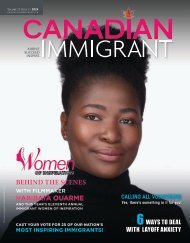Canadian Immigrant - November 2023
University’s President Ana Serrano is playing a key role in shaping Canada’s arts and culture sector Canada continues to provide a warm welcome to refugees and displaced people Building a career in the skilled trades and more!
University’s President Ana Serrano is playing a key role in shaping Canada’s arts and culture sector
Canada continues to provide a warm welcome to refugees and displaced people
Building a career in the skilled trades
and more!
You also want an ePaper? Increase the reach of your titles
YUMPU automatically turns print PDFs into web optimized ePapers that Google loves.
LIVING
around the shocked family, staying close and listening. “My feelings were
valued,” says Seitaj.
Over time the Ukrainian family merged with that of their Canadian hosts.
Both have children of the same age, who regard each other as siblings. Even
after the newcomers moved out on their own, they’ve still been keeping in
close touch. “We consider each other family,” says Seitaj.
Today Seitaj has fully integrated into her adopted country. She’s
a settlement worker at the YMCA and is expecting the arrival of her
Canadian baby.
Seitaj credits her successful adjustment not only to her host family, but
also to the larger Canadian society who welcomed the couple so warmly.
“I’ve never ever seen this kind of generosity,” says Seitaj. “You start to
believe in humanity again.”
Senior resettlement officer at UNHCR Canada, Michael Casasola, is not
surprised by Seitaj’s warm reception. “Canada can be quite welcoming,”
says Casasola.
Through the years, Canada has shown a knack for integrating refugees,
says the expert. For those who meet the refugee designation, there are two
main channels of assimilation: government-assistant refugees (GARs) and
private sponsorship of refugees (PSRs). In the PSR program, humanitarian
and religious organizations or a private group of Canadians pool their
resources to support a refugee family financially and logistically for at least
one year. The sponsors help their dependents find housing, furniture and
clothing, locate language courses and enroll refugee children into schools.
Sponsors are also good sources of social capital, connecting refugees with
potential employers. Because of their personalized contacts, refugees
who enter the PSR stream have better integration outcomes short term
compared to GARs, says Casasola. In the long run, both streams of refugees
integrate successfully, with levels of homeownership and education
ultimately reaching that of native Canadians.
The PSR program was established as part of the Immigration Act of l976,
a few years after Canada had signed on to the Refugee Convention. Refugees
from Vietnam, who were admitted to Canada in the late 1970s, were the first
to benefit from the program. The Syrians fleeing civil war in their country
were the last large group of refugees admitted into the PSR program in 2015-
2016. Today several countries around the world have adopted Canada’s PSR
program, including Australia, New Zealand, Ireland and the UK.
But the Ukrainians’ situation was very different from that of most other
refugees to Canada. In an effort to fast-track large numbers of people fleeing
war, Canada processed the Ukrainians under the category of emergency travel.
Without the refugee designation, these de facto refugees were not entitled to
programs like the government assisted refugees or the private sponsorship of
refugees. In response to their overwhelming needs, private Canadian citizens
stepped up to the plate, hosting Ukrainians for free in their homes, orienting
them to Canadian programs, and served as emotional supports.
The hosting program’s benefits overlap with those of the privately
sponsored refugees program, says Casasola. Both sponsors and hosts guide
refugees through the Canadian landscape, practice English with them, and
befriend them. These personalized interactions propel refugees forward
with more assurance in their new lives.
For the Alshamalys, a refugee family from Syria, Canada’s PSR program
helped them kickstart their shattered lives. The Alshamalys had never
dreamed of uprooting their perfect lives in Syria — Ahmad Alshamaly
had a lucrative career as an IT engineer, they had a comfortable home, and
family just minutes away. But when the war broke out in 2011 and their
above Anastasiia Seitaj and her family
then two-year-old daughter, Shahd, saw blood on the streets, Ahmad and
his wife Nour knew they had no choice. “We were emotionally destroyed,”
says Alshamaly, who brought his family to Turkey and then Canada in 2016.
Their group of PSR sponsors immediately made the immigrants feel
comfortable. One of them picked up the Alshamalys at the Toronto airport.
The sponsors helped them open a bank account, located a good school for
the children, and found language training for the adults. Another one
helped Alshamaly connect to several companies, helping him secure a job
in IT just a month and a half after landing in Toronto.
The sponsors were also nurturing. Shortly after their arrival, the
Alshamalys were invited to their first Thanksgiving dinner, followed by
supper on Halloween. Over many meals, the Alshamalys bonded with their
sponsors and created an alternate community. “Everything was new to us,”
says Nour, “they helped us feel like we belong to this place.”
The advantages of these new connections were beneficial for both
sides, says Alshamaly, who recently launched his own startup, Hyphonics
Edugames, which teaches children a fun way to learn Arabic. Meanwhile,
Nour opened a catering business, Jasmine Kitchen sharing her culture
through her cooking.
The couple’s two daughters, Sedra and Shahd, are telling the world about
Syrian children in refugee camps. The sisters paint scenes of refugee life
onto postcards that are filled with wildflower seeds, ready to bloom.. This
enterprise raises both money and awareness of Syrian refugee children.
Today the Alshamalys are fully integrated into the fabric of Canadian life
– their children have music lessons and the whole family enjoys camping.
The family feels grateful not only to their sponsors but also to the wider
Canadian public who greeted them with open arms. “Most of Canadians are
welcoming,” says Alshamaly. “We feel lucky.”
CANADIANIMMIGRANT.CA | 25





